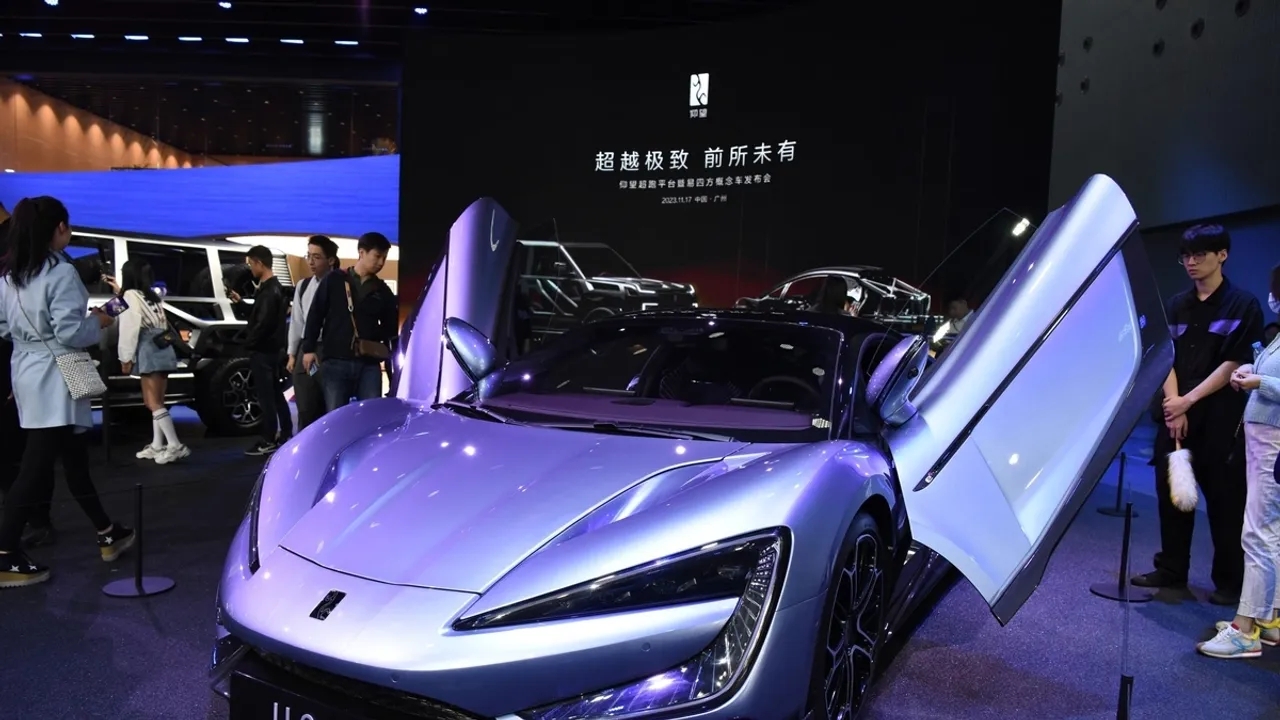BYD launches a luxury electric sports car to compete with automotive giants, marking a pivotal shift in the EV market. This move highlights the growing rivalry between traditional automakers and Chinese EV manufacturers.

With the launch of its latest electric sports car, BYD sets its sights on competing directly with automotive giants such as Volkswagen and Toyota, marking a significant shift in the global electric vehicle (EV) market. The move underscores the intensifying rivalry between traditional automakers and Chinese EV manufacturers, with BYD's $230,000 price tag signaling its entry into the luxury vehicle segment.
Breaking Ground in the EV Arena
BYD's strategic decision to launch a high-end electric sports car comes at a time when the EV market is witnessing exponential growth. This bold maneuver aims to capture a niche segment of consumers looking for luxury, performance, and sustainability. The new model, which rivals the Tesla Model 3, is part of a broader strategy by Chinese EV makers such as BYD and SAIC Motor Corp. to challenge the dominance of established players like Toyota, Volkswagen, and General Motors.
The Competitive Landscape
The entry of BYD into the luxury EV market is not just about expanding its product lineup; it's a direct challenge to the established order of the global automotive industry. With this move, BYD is signaling its ambition to be a major player not only in China but on the world stage. The competition is heating up as automakers worldwide scramble to secure their place in a future dominated by electric mobility. Traditional manufacturers are investing heavily in electrification, while new entrants are leveraging innovative technologies to carve out their niches.
Implications for the Future
The launch of BYD's electric sports car is more than just the introduction of a new vehicle; it's a glimpse into the future of the automotive industry. As companies like BYD continue to push the boundaries of what's possible in electric mobility, consumers stand to benefit from a wider range of choices, enhanced performance, and innovative features. This shift towards electrification is also a critical component in the global effort to reduce carbon emissions and combat climate change, making the stakes even higher than market share alone.
The battle for dominance in the EV market is not just about cars; it's about shaping the future of transportation. As BYD and its rivals press forward, the landscape of the automotive industry will continue to evolve, driven by innovation, competition, and a shared vision for a cleaner, more sustainable world. The implications of this shift extend far beyond the showroom, influencing global energy policies, environmental strategies, and the very way we think about mobility.
BYD launches a luxury electric sports car to compete with automotive giants, marking a pivotal shift in the EV market. This move highlights the growing rivalry between traditional automakers and Chinese EV manufacturers.

With the launch of its latest electric sports car, BYD sets its sights on competing directly with automotive giants such as Volkswagen and Toyota, marking a significant shift in the global electric vehicle (EV) market. The move underscores the intensifying rivalry between traditional automakers and Chinese EV manufacturers, with BYD's $230,000 price tag signaling its entry into the luxury vehicle segment.
Breaking Ground in the EV Arena
BYD's strategic decision to launch a high-end electric sports car comes at a time when the EV market is witnessing exponential growth. This bold maneuver aims to capture a niche segment of consumers looking for luxury, performance, and sustainability. The new model, which rivals the Tesla Model 3, is part of a broader strategy by Chinese EV makers such as BYD and SAIC Motor Corp. to challenge the dominance of established players like Toyota, Volkswagen, and General Motors.
The Competitive Landscape
The entry of BYD into the luxury EV market is not just about expanding its product lineup; it's a direct challenge to the established order of the global automotive industry. With this move, BYD is signaling its ambition to be a major player not only in China but on the world stage. The competition is heating up as automakers worldwide scramble to secure their place in a future dominated by electric mobility. Traditional manufacturers are investing heavily in electrification, while new entrants are leveraging innovative technologies to carve out their niches.
Implications for the Future
The launch of BYD's electric sports car is more than just the introduction of a new vehicle; it's a glimpse into the future of the automotive industry. As companies like BYD continue to push the boundaries of what's possible in electric mobility, consumers stand to benefit from a wider range of choices, enhanced performance, and innovative features. This shift towards electrification is also a critical component in the global effort to reduce carbon emissions and combat climate change, making the stakes even higher than market share alone.
The battle for dominance in the EV market is not just about cars; it's about shaping the future of transportation. As BYD and its rivals press forward, the landscape of the automotive industry will continue to evolve, driven by innovation, competition, and a shared vision for a cleaner, more sustainable world. The implications of this shift extend far beyond the showroom, influencing global energy policies, environmental strategies, and the very way we think about mobility.
TEL : +86-132 6020 9406
EMAIL : lee2802@vip.126.com
WECHAT : vivianlee2802
ADD. : No.18 of Jianshe Road, Liangxiang Kaixuan Street, Fangshan District, Beijing,China

QR Code for WeChat
